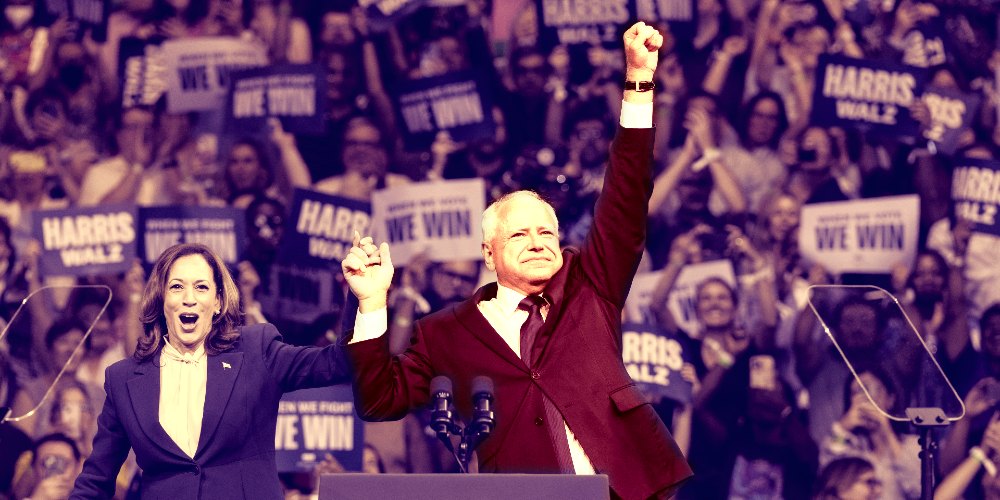The Extremist Roots of Tim Walz: A Closer Look at His Radicalization
 By PUBLIUS
By PUBLIUS
In the murky waters of American politics, the ascent of Tim Walz, the Democrat vice-presidential nominee, raises eyebrows and questions. His political journey is steeped in the radical ideologies of Paul Wellstone, a figure whose ties to the Democratic Socialists of America and Marxist influences are well-documented. Is Walz merely a puppet of a far-left agenda, or does he genuinely embody the progressive ideals he espouses?
Now, after seemingly rushing to elevate Walz to the national stage, one must wonder about the implications of his radical roots. Before his political career, Walz was a high school teacher and football coach in Mankato, Minnesota, presenting himself as a humble outsider. However, his true political foundation was laid in January 2005 at Camp Wellstone, a training camp designed to indoctrinate grassroots progressives in the radical methods of Wellstone himself. This camp, named in honor of a man who once declared, “I am an old Alinsky organizer,” served as a breeding ground for those who would push the boundaries of acceptable political discourse.
“I am an old Alinsky organizer.” – Paul Wellstone
The camp was not just a place for learning; it was a launchpad for a new generation of leaders, including Walz, who would go on to achieve a stunning victory in Minnesota’s conservative 1st Congressional District in 2006. This victory was no accident; it was the result of a carefully orchestrated campaign, bolstered by fellow Camp Wellstone alumni. The radical roots of this camp are undeniable, as it was heavily influenced by figures like Frances Fox Piven and Heather Booth, both of whom have long histories in radical activism.
“He is a radical and, yes, a 1960s radical at that.” – Washington Post
The legacy of Paul Wellstone is one of confrontation and civil disobedience, a legacy that Walz has embraced wholeheartedly. His political rise mirrors that of Wellstone, who, with the backing of the Democratic Socialists of America, shocked the political establishment by defeating a two-term Republican incumbent in 1990. The DSA’s influence on Wellstone was profound, and it continues to echo in Walz’s career.
“The first 1960s radical elected to the US Senate.” – Mother Jones
Walz’s connections to Camp Wellstone are not just historical footnotes; they are the bedrock of his political identity. The camp has produced a cadre of progressive leaders, including Minnesota Attorney General Keith Ellison and St. Paul Mayor Melvin Carter. It is a veritable incubator for radical thought, with its advisory committee featuring prominent socialist leaders and activists.
“You could tell he was a leader.” – David Wellstone
The training Walz received at Camp Wellstone was instrumental in shaping his political skills. As Marcia Avner, a longtime progressive activist, noted, “What you see is what we saw back then, but it has been strengthened with extraordinary experience.” This experience has allowed Walz to navigate the treacherous waters of modern politics, often with the guidance of his former trainer, Peggy Flanagan.
“He was my camper; I taught him everything he knows!” – Peggy Flanagan
Flanagan’s influence on Walz cannot be overstated. She has been a key player in shaping his progressive agenda, often being described as his “progressive whisperer.” Walz himself has acknowledged her role, stating, “[For] every major decision she is there from the beginning.” Together, they have pushed through some of Minnesota’s most radical legislation, all while invoking the legacy of Wellstone.
“We all do better when we all do better.” – Peggy Flanagan
The radical legacy of Wellstone looms large over Walz’s political career. His deep ties to the DSA and other far-left organizations raise serious questions about the direction of the Democratic Party. As the DSA proudly proclaimed, “The DSA and its allies on the left are a force that cannot be ignored.”
“No one does it better.” – Jon Youngdahl
The implications of Walz’s radical connections extend beyond Minnesota. His past involvement in a student exchange program with China and his numerous trips to the country have sparked controversy and raised eyebrows. The House Oversight Committee is now investigating these ties, questioning the nature of his relationship with the Chinese Communist Party.
“He has been so seasoned by the work here.” – Pam Costain
As the 2024 election looms, the Walz-Harris ticket appears to be a harbinger of a more radical Democratic agenda. With figures like Bernie Sanders suggesting that Kamala Harris has adjusted her positions to be more “pragmatic,” one must wonder what this means for the future of American politics.
“He has demonstrated a remarkable ability to evolve as a public leader, uniting Democrats’ diverse coalition to achieve significant milestones for Minnesota families of all backgrounds.” – Elianne Farhat
In a political landscape rife with uncertainty, the radical influences that have shaped Tim Walz’s career cannot be ignored. As he and Flanagan continue to push the boundaries of progressive politics, the question remains: will the American electorate embrace this radical vision, or will they push back against the tide of extremism?
“I want to burn down the system, and you want to get into the system and change it from the inside out.” – Marvin Manypenny
As we reflect on the legacy of Paul Wellstone and the rise of Tim Walz, it’s clear that the radical left is alive and well in American politics. The question is, how far will they go to achieve their goals?
“It’s always a sad day to think Paul and Sheila…” – Peggy Flanagan
In the end, the radical legacy of Wellstone endures, and with it, the potential for a more extreme Democratic agenda. The stakes have never been higher, and the American people must remain vigilant.
Original Here

|
⭐⭐⭐⭐⭐

